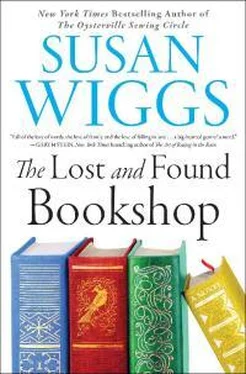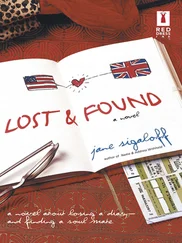“It’s all right. I’ll sign a stack of books so you’ll have some on hand.” She scrawled her name in the books and ate another cookie.
“Thanks for being a good sport,” Natalie said.
“Thanks for being a good bookseller,” Quill said. “Mind if I take some of these cookies with me?”
“Of course. Help yourself.”
The author left, still unfailingly cheerful. Natalie turned to Frieda. “I’m mortified.”
“Don’t be. She’s lovely. I can’t wait to dive into her book.”
“God, Frieda. I wish I could clone you.”
“Ew. No. Listen, your mom would be proud. She endured her share of book signings where she and the author just sat there with egg on their faces.”
“Really? I don’t remember that.”
“She was a trouper, your mom. I miss her every day.”
Natalie nodded. She was getting a sugar high from all the cookies. “Why didn’t Mom ever fall in love?”
“Blythe? She did, all the time. Just didn’t stay in love. She finished with guys the way she finished books—closed them with gratitude and moved on to the next.”
“Dean Fogarty came by after the memorial.”
Frieda’s eyebrows went up. “Did he, now?”
“I’m not sure why. We’ve never been close.”
“I think—and with all due respect to your mother—that Blythe wanted it that way. He wanted to be more involved, but she didn’t let him. She was grateful for the tuition payments, but—”
“ What? ” Natalie nearly choked on her cookie. “Tuition payments?”
Frieda fell still. “Oh, shit. You didn’t know.”
“I didn’t know. Now you need to tell me everything.”
“It’s . . . I wasn’t privy to all the details, but Dean paid your private school tuition. He set up a 529 plan for college, too. That’s what Blythe told me.”
“She didn’t tell me ,” said Natalie. “Why didn’t she ever say anything?”
“Blythe had her pride. And her secrets. Shoot. I betrayed a confidence.”
“I don’t know, Frieda. Mom’s gone, so it’s okay that you told me. I’m glad you told me.” She started folding up chairs and putting them away, and Frieda pitched in. “Now what? Do I contact Dean?”
“That’s up to you, sweetie. Take your time, okay?”
“I will.” Natalie made a special display of Quill’s books and vowed to hand-sell every last one of them.
13
Early the next Saturday morning, Natalie woke up to the ominous beep of an alarm. Tipping her head to one side, she tried to pinpoint the source of the sound. It wasn’t the security alarm—that one was silent and an alert would have appeared on her phone. It wasn’t the shriek of the smoke alarm, either. Something from Grandy’s room? Since he’d wandered away, she’d reprogrammed the building security system to alert her when an exterior door opened.
She threw on a sweater and slippers and took the back stairs to her grandfather’s apartment. Through a crack in the door, she could hear the peaceful, soft whistle of his breathing. Without his hearing aids in, he tended to sleep soundly.
The beeping grew louder as she approached the basement door. Flipping on a light, she went down the stairs, noticing a dank smell. The light fell over the big old letterpress and the workbench where they cleaned up and restored the vintage books. When she reached the bottom step, her feet landed in ankle-deep cold water.
She gasped and jumped back onto the stairs. “What the hell?” she asked, shuddering and peering through the shadows. In a far corner of the space, a red button was blinking. Gritting her teeth, she waded over to it and pushed the button, and the alarm fell silent. “Damn it,” she muttered, wading back and then hurrying upstairs to find her phone. She peeled off her sodden slippers, then scrolled through her contacts.
Peach Gallagher picked up on the third ring with a sleepy “Yeah?”
“It’s Natalie Harper,” she said. “I’m sorry to call you on the weekend, but I didn’t know who else could help.”
A yawning sound came through the line. She pictured him in bed with his wife, who probably moaned and snuggled deeper under the covers. “What’s up?” he asked.
“I’ve got a flood in the basement. An alarm woke me up. Can you come?”
“I . . . Only if it’s okay to bring Dorothy along.”
“Of course. She’s always welcome. That’s no problem at all. Again, I’m sorry to—”
“Hang tight. We’ll be there soon.”
She rushed to get dressed, glancing at her unkempt image in the bathroom mirror. “I swear, Mom,” she said to her mother, “I have no idea how you did this, day in and day out. Did you just run from one disaster to the next?”
She piled her hair into a ponytail and brushed her teeth, then dressed in jeans, a gray college sweatshirt, and flip-flops.
She hesitated, wondering about lipstick and maybe a more attractive top. No. This was hardly a date. A workman was coming over to deal with her flood. He didn’t care what she looked like, and she shouldn’t care, either.
Across the street, the bakery was just opening for the day. The least she could do was offer Peach and Dorothy a snack. She grabbed some fresh cinnamon rolls and a jug of cider, then went back to the shop and turned on the coffee machine.
Grandy was up, hearing aids in, trousers on, shirt buttoned wrong. He greeted her with a blank-eyed stare. “Did you call the fire department?” he asked.
That cloudy stare always rattled her. It made him seem like a stranger instead of the man she’d known all her life. “Oh—you heard the alarm? There’s no fire. It’s a flood in the basement. I called Peach.”
Grandy frowned. “Peach.”
“Gallagher. The hammer for hire. He’s been working on the building every day, Grandy.”
“Ah, that one. Did the sump pump fail again, then?”
“It’s done that before?”
“It has.” He paused, and in a brief, subtle moment, his eyes seemed to focus on her face, and the endearing wrinkles of his smile appeared. He held out his arms. “And a good morning to you, Natty-girl,” he said, his voice firm now.
She hugged him, taking in his scent of witch hazel and toothpaste, the comforting warmth of his arms. Stay with me , she thought, holding on to the moment.
“Have a seat,” she said. “I brought cinnamon rolls.”
“Lovely,” he said. “We used to have breakfast together every morning before you went away to school.”
She beamed at him, flooded with relief. Each time he mentally left her, she couldn’t be sure she’d get him back. “I remember. You made the best toast, and you let me dunk it in your coffee. Here, let me fix this.” He sat patiently while she unbuttoned and rebuttoned his shirt.
“I always shared a silly book with you,” he said, “because I wanted to send you off with a smile.”
“ The Watchbirds ,” she recalled. “ Babar and the Wully-Wully. And I Mean It, Stanley. We used to laugh and laugh.”
“That is the best part of a grandfather’s job—making a child laugh.” He paused. “You don’t laugh much anymore, Natty-girl.”
“I . . . Hey, let’s see if we can find more things to laugh at. It’s hard to find the humor in a flooded basement, but maybe later we can watch something funny on TV.”
“ Benny Hill ?”
She tried not to cringe. “ Happy Gilmore ,” she countered, handing him a napkin. “There’s fresh cider, too. The bakery across the street gets theirs from an orchard up in Archangel, where I used to live.” She poured him a glass from the chilled jug.
“Do you miss it, then?” he asked. “Your life up in Sonoma County?”
She set the glass in front of him. “I don’t know. Sometimes . . . It’s so beautiful up there. I never really liked my job, though,” she confessed.
Читать дальше












